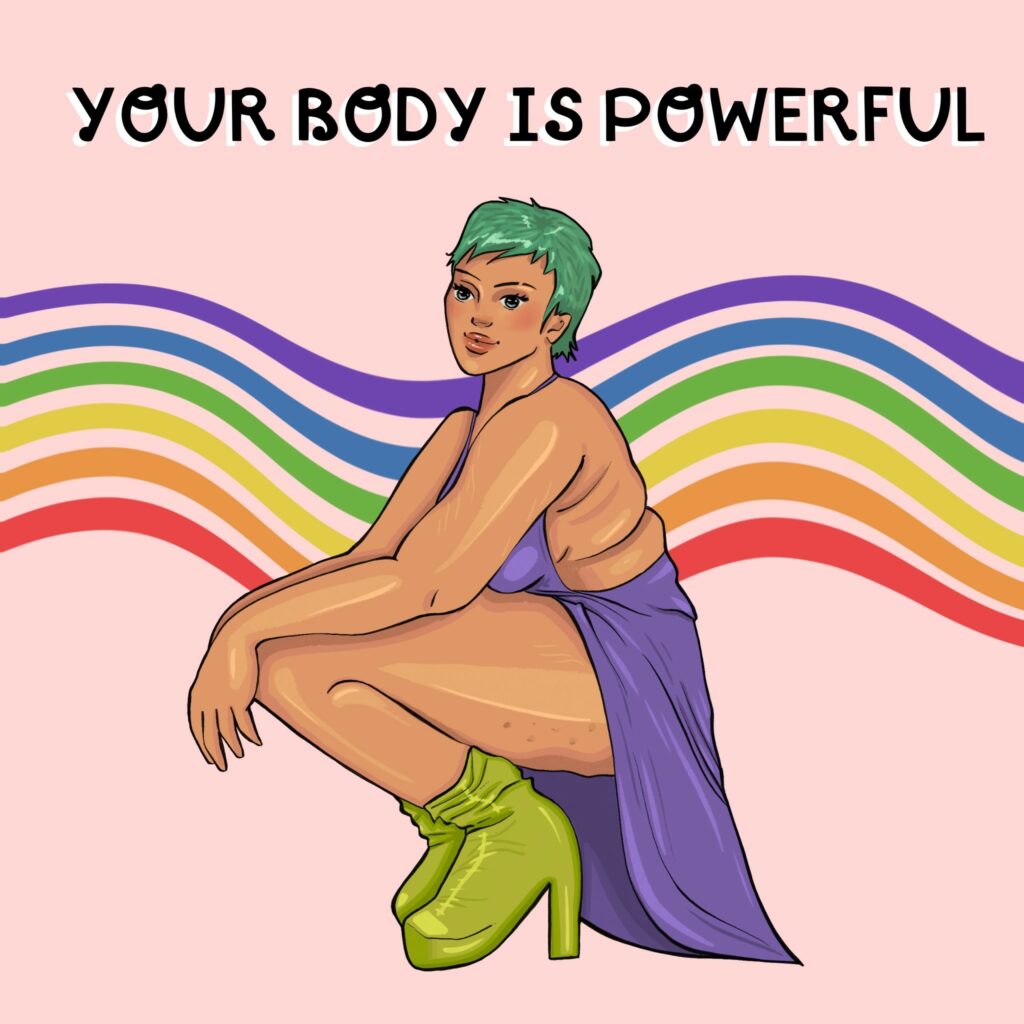
Essie Dennis is a queer author, artist and body positivity advocate. Her first book, Queer Body Power, challenges accepted beauty standards and the concept of ‘the perfect body’, taking the reader on a journey to self-acceptance and body satisfaction. From gender, sexuality and reclaiming your body, through to food, politics, social media and fatphobia, this radical book starts a conversation about body image and mental health that queer people are so often left out of. We spoke to Essie about how coming out as queer helped her to come to terms with her body.
When I think about queerness, it extends beyond just who we sleep with. What became most apparent to me when I finally came out is that there were now a plethora of societal rules I felt released from. One of the first ways I was truly able to express this sense of freedom was through my body.
We all make jokes about the queer urge to get a buzz cut or a tattoo the minute we come out, but it’s all just indicative of a newfound sense of body freedom. As someone who is AFAB, there were some very specific body rules I used to abide by, which coming out helped me unpack:
- Keep your hair long.
- Wear tight clothes that “show off” your curves.
- Stay small, as small as you can. Maybe eat a grape or two.
- Make sure, no matter what, you are desirable to cishet men above all else.
When I came out, it suddenly felt like I could bend the rules, or even break them. I had been afraid to fully accept who I was but more than that, I had spent my life believing that what other people thought about my body was more important than what I thought about my body. Being openly queer was a very liberating experience and showed me just how much my problems with my body were related to being queer and feeling misunderstood.
Queer people deserve to have spaces to talk about their bodies. Body Positive spaces and eating disorder recovery spaces online often put thin, cishet women at the forefront, which means that some of the issues I was having simply weren’t being highlighted. When I came out, I started to realise that a lot of my own issues with my body and food were actually to do with my gender and my desire not to be perceived as a cishet woman. Coming out changed the way I dress, behave and ultimately feel about my body. I remember buying a lot of books on gender and finally understanding the feelings of dysphoria and euphoria I hadn’t been able to place. Giving me words to describe certain feelings about my body made it easier to understand how I wanted to present myself.
My body started to feel powerful and radical to me, which was such a positive experience. So much of that came from reclaiming my body as my own.
Coming out also made me realise how much my idea of what is “attractive” has been warped throughout my life. Thinness was always considered the most desirable thing you could be but thinness has nothing to do with how I desire people. I grew up thinking that fat was something to fear. I don’t feel that way anymore. How is the diversity in our human bodies not amazing? Embracing the fact that our sexualities and our ideas of beauty can be completely varied also allowed me to look at myself differently. To be loved and desired when I thought my body didn’t deserve that was eye-opening. When I was a kid, I would spend so long aching over the bodies of lithe, young, able-bodied women with glossy blonde hair. Everyone treated them so well and I completely fixated on them. I believed that, as long as I could somehow get thinner, I would be valued. As an adult, being valued in a queer relationship made me realise how much time I had wasted thinking that I needed to change my body to be loved.
Ultimately, I think that choosing to prioritise your own happiness often opens the door to re-evaluating the way you view yourself. Being openly queer was about taking control of my own identity and how I experienced the world. My body was a big part of that. I didn’t want to spend my whole life feeling like I needed to change myself. I just wanted to be myself.